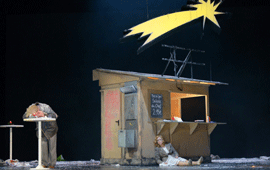
On the Footsteps of a Romanian Mezzo-soprano
Tuesday, 12 June 2012
, ora 13.06
Oldenburg, an authentic patriarchal German city, prides itself with its beautiful Neo-Renaissance theatre dating from 1833, on which stage performs almost only young artists, and which hall, is usually, filled with spectators. There, I had the opportunity to watch, in premiere, the opera
'La Bohème' by Giacomo Puccini, a new production directed by Lorenzo Fioroni: instead of the bohemians garret, a penurious booth on an empty street. Instead of the Café Momus in the Latin Quarter, the Lafayette Gallery - on stage for the protagonists - while the entire hall, with its three rows of balconies, was loudly invaded by the choir. Instead of the toll gate, the City dump where homeless people ferret about. A 21
st century
'La Bohème', without poetry, in which the poverty is sordid, the lack of preconceptions is highlighted vulgarly, the heroes' drama is cruelly accentuated, a few differences from the Puccini's vision, certain inconsistencies with the director's own view, but with also a few inspired ideas.
For me, the highest point of interest was the performer who portrayed Mimi, soprano Angela Bic, about whom you have probably heard about; I have commented in the past some of her portrayals on the stage of the Dortmund Opera. Angela Bic is - to refresh your memory - from a family of musicians, Romanian-Chinese; an exotic arrival, a talented actress, soprano with a generous and worm voice, with expressive, highly nuanced articulation. She was still the same when I saw her again in 'La Bohème'; her superb acute C - drifting off the stage at the end of act I - still rings in my ears, just like the brave pianissimos which have managed to tame the often excessive sound intensity of the orchestra. She was the star of the evening in a cast that was involved truthfully and artistically in the project; she was the audience's favourite, intensely applauded at the end.
Ligia Ardelean
Translated by Florina Sămulescu
MTTLC, Bucharest University















